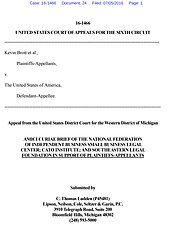Brott v. United States
Learn more about Cato’s Amicus Briefs Program.
James Madison once wrote: “Government is instituted to protect property of every sort .… This being the end of government, that alone is a just government, which impartially secures to every man, whatever is his own.” Because the power of eminent domain so readily runs the risk of violating private property rights, you would think that those individuals subjected to it would be afforded every procedural protection the Constitution has to offer—including the right to a trial by jury. But according to the federal government, you would be wrong. A group of 20 Michigan landowners decided to contest the feds’ use of eminent domain, or at the very least asked to receive the just compensation due them under the Fifth Amendment’s Takings Clause, as well as a jury trial, thus challenging a provision of the Tucker Act that directs suits against the government for over $10,000 to be brought in the Court of Federal Claims (a legislative tribunal rather than an Article III court). The federal district court in Michigan sided with the government and dismissed the case for lack of jurisdiction, holding that Congress is within its powers to override the Seventh Amendment’s guarantee of the right to jury trial when the federal government is the defendant (because of “sovereign immunity”). The district court effectively shielded the government from constitutional checks and balances that protect individuals’ property rights, which is why Cato joined the National Federation of Independent Business on an amicus brief in the next stage of the case, before the U.S. Court of Appeals for the Sixth Circuit. The Seventh Amendment’s guaranteed right to a trial by jury is one of the oldest rights recognized in Anglo‐American law. In City of Monterey v. Del Monte Dunes (1999), the Supreme Court held that, because the claimants in takings cases are seeking compensation, such claims would have been heard by a court of law (rather than, say, an admiralty court or other specialized tribunal) at the time the Seventh Amendment was passed. Accordingly, whenever plaintiffs ask for a determination of just compensation, the right to a jury trial always attaches. Indeed, takings cases are exactly the sort of cases that should be resolved by a jury trial, because they involve factual determinations with which members of the local community are likely best acquainted. The Supreme Court has not once held that the federal government can hide behind the doctrine of sovereign immunity in this manner, picking and choosing when it wants to exempt itself from the Seventh Amendment when citizens are seeking to enforce another constitutional right. Historically, not even the king of England could exempt the crown from private‐property suits—and the U.S. government does not have greater powers to deprive individuals of their private property without the just compensation that a jury determines is due.
